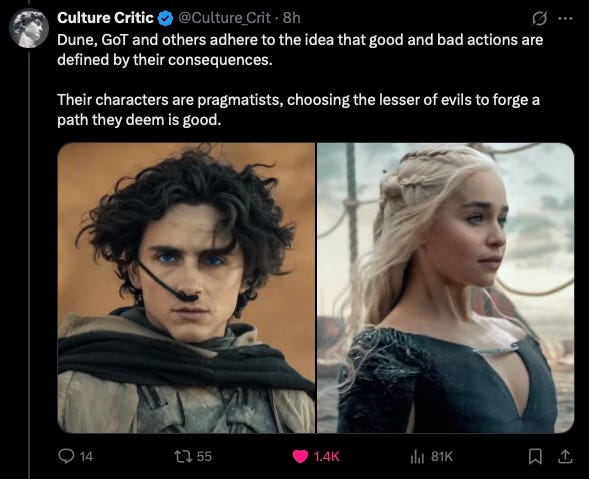Culture Critic Absolutely Nails One of the Most Important Distinctions of Our Time
Teasing out Tolkien from the rest of them.
You may or may not be familiar with Culture Critic. If you aren’t, then you are missing out on some of the best, and most uplifting, content on the Interwebs. He’s more active on Twitter than here, but I do recommend subscribing to his Substack. (And yes, he’s a he - he’s made it clear at least once.)
Earlier today, CC posted this thread, on why Tolkien hated Dune - but it’s really about much more than that. It’s about a fundamental distinction that divides our world. It’s a distinction I’ve struggled to express for many years, and will likely continue to struggle to express, and that CC has done a fantastic job of getting at.
For myself, I became aware of this distinction because of my childhood experience in both a traditional Montessori school, and later in government schools. The most striking difference to me was the culture – and the morality and philosophy that underlay each one. As an adult, and especially as a parent, it has become even “louder” in my psyche, and I see the dividing line everywhere: In film and TV, in politics, in religion, and perhaps especially in parenting.
I’ve never believed in “reward and punishment” parenting. Maria Montessori understood this, and after reading CC’s thread, I believe Tolkien did too. You cannot punish a child into being a good person. You also cannot reward a child into becoming good. (This is a very good book on the topic.) That impulse comes from another place. It can be nurtured by parents, or it can be crushed by them. But it cannot be beaten nor bribed into them. True morality does not spring from pragmatism.
Culture Critic’s thread on Tolkien v. Dune (and Game of Thrones, etc.) gets at this. It gets at the mentality of those who order their lives around practical outcomes, whose morality stretches no further than the extent to which an outcome is beneficial to themselves or those they care about – and it contrasts that worldview with a different, and admittedly much less common worldview. The worldview that says there are some things, some acts, some choices, that have inherent goodness in them, and that it is that inherent goodness that ought to be pursued and honored.
I still have trouble articulating exactly what this distinction is, and there is much more to say about it. But this thread does a very good job of pointing to it:
You can see the whole thread here.





Great post and thread!
"I still have trouble articulating exactly what this distinction is, and there is much more to say about it. But this thread does a very good job of pointing to it"
—Can we at least start by saying that morality can be divided first into two categories?
A. Not doing bad things to people.
B. Doing good things for people.
Those who observe, effect, and embody A. are probably more likely to do B. Certainly people who do B. are more likely to do A.
I am pretty confident that I can define A. and explain exactly why it exists, and exactly why your rights are real. The chart here helps: https://christophercook.substack.com/p/exact-moment-i-became-anarchist
(Also explained in more detail in 1.0–1.5 here: https://christophercook.substack.com/p/humans-we-have-problem-consent)
Those explanations also demonstrate (to my satisfaction, at least, haha) why violations of A. are punishable and violations of B. are not.
I am not saying morality is easy to understand, but I do believe the basics are provable, and lead to conclusions about rights that are true, and that indicate that rights are a natural phenomenon.
And I would love to have this discussion with Tolkien. I believe he would agree.
I loved that thread, too! LOTR, really much of Tolkien, is like the Bible for me. I reread it regularly, highlight, quote, reflect, ponder. I liked Dune as a sci-fi story but that’s as far as it went. I hated every page of GoT as a nihilistic nightmare. I only read it all because I was trapped in a hospital bed.